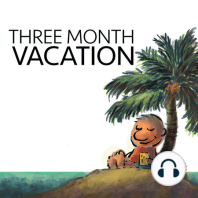7 min listen

How To Get Smart (And Stay Smart)
How To Get Smart (And Stay Smart)
ratings:
Released:
Feb 11, 2017
Format:
Podcast episode
Description
Many of us believe that smartness comes from learning the skills in our own field. And yet, that's only partially true. We can never be as smart as we want to be, if we only have tunnel vision. So how do we move beyond? And how do we find the time to do all of this learning? Amazingly it all comes from limits. Find out more in this episode. In this episode Sean talks about Part 1: Learning all you can in your own field Part 2: Learning all you can in an area where you have no expertisePart 3: Working with limits ---------------------------- Last month I got an invitation from a group asking me to dinner. The dinner it seems was a group of startups. They wanted to spend the evening with Renuka and I and have a conversation about how to get started and to keep that momentum going. What they wanted most of all was the promise of the “Three Month Vacation.” Yes, they were start ups, but what would it take for them to get going and then not spiral out of control. What would it take for them to become successful without being sucked into the mantra of “more, more and even more.” The answer to their question was relatively short But as I chugged on my mojito, I got another question that people tend to ask all the time. The question: how do you get really smart? Is there a shortcut? And how do you stay smart? That's what I would like to cover in this piece. In my opinion, there are two ways to get smart—and one tool to make sure you get there efficiently. The three elements we'll cover are: – Learning all you can in your own field – Learning all you can in an area where you have no expertise – Working with limits I wasn't always a copywriter. I didn't always write sales pages or articles. While I was in university, I decided to earn some money by selling my cartoons to newspapers. A newspaper called the “Indian Post” had just started up in Mumbai, and I was encouraged to meet the features editor, Reena Kamath. Reena, or “Chips” as she was called, was this incredibly kind and educated person. I was, in my own head a cartoonist, but not a very confident one. What Chips did was to give me enough confidence to push my art a lot more. She encouraged me to learn how to cartoon even better, so much so that I soon published my work in other magazines and newspapers. By the time I was headed to graduation day, I had two daily comic strips in two big newspapers. All of this confidence didn't mean a thing when I joined an advertising agency “Yes, you're really good at cartoons,” said the creative director at the Leo Burnett agency, “but you realise that advertising and cartooning are completely different, right?” Once again I was back in newbie land. I didn't know enough to get going in the world of copywriting. Fortunately for me, I was given the honorary title of junior copywriter, a small stipend and left alone to do pretty much anything I wanted. Which is when I found the agency library If you're in advertising, you'll fondly remember these massively thick books called the “One Show.” These doorstepping books contained hundreds of real-world advertising. And so began my education in the world of advertising. Which brings us to the first point in this article: learning all you can in your own field. The very concept of learning everything is, as you know, impossible Yet, what choice do we have? Everything seems to rush along madly and just to keep on top of things is quite a task. But do we have a choice? Back when I was in the Leo Burnett agency, the library was enough to keep me busy for months on end, and today we have more in a folder of our computer than we had back then. Armed with little choice, here's what I do I read as much as I can. I'll plough through as many books as possible. Right now I have eight books sitting on my desk and at least four-five unread on the Kindle. There are months when I'm reduced to reading books at a snail's pace, so I find it smarter to read magazines articles instead. However, my secret weapon is audio. I
Released:
Feb 11, 2017
Format:
Podcast episode
Titles in the series (100)
Is The Four-Hour Work Week A Waste Of Time?: Why A Four-Hour Workweek Isn't What We Really Want by The Three Month Vacation Podcast